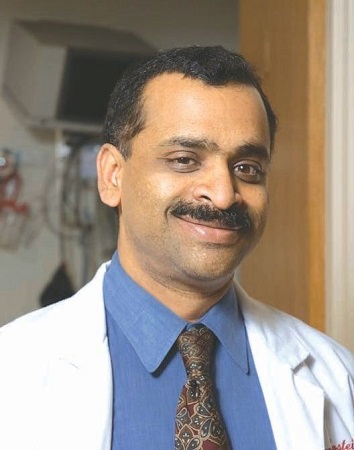Dr. Ponnandai S. Somasundar, a cancer surgeon, was promoted to chief of Roger Williams Medical Center’s oncology surgery division last month. Somasundar, who also serves as director of the center’s geriatric oncology program, has been on staff at Roger Williams since 2007 and was promoted to associate professor of surgery at Boston University School of Medicine in 2013.
Somasundar discusses his new position and his hopes to advance the center’s geriatric surgery program.
PBN: What are your priorities as you are settling into your new role as chief of surgical oncology at Roger Williams Medical Center?
SOMASUNDAR: The division has established itself as the leading provider of minimally invasive pancreatic and liver cancer surgery and a priority will be to expand the hepatopancreatobiliary presence into the region. In addition, we will strengthen other cancer specialties to make the division stronger.
Outcomes from complex surgery are a particular passion of mine and particularly the geriatric cancer patient. The Center for Quality and Outcomes for Surgery and Oncology has been started to focus on research that will improve clinical outcomes research. One of our goals will be to become credentialed as one of the first few hospitals in the country for the Geriatric Surgery Verification Program as conducted by the American College of Surgeons.
Community outreach is essential to improve access and availability to quality cancer treatment with such programs as Comprehensive Oncology Program for Elders. CQOSO also focuses on underrepresented populations through a cancer outreach program led by Dr. Abdul Calvino. This has served the Hispanic population with increased colonoscopy and mammogram access. We would like to expand access further to other underrepresented minorities.
We have a strength in educating medical students, surgical residents and fellows. Postgraduate education will continue to be a priority, and the division is responsible for one of the few complex surgical oncology fellowship training programs in the country.
PBN: What new responsibilities will you be taking on?
SOMASUNDAR: The new responsibility would be to administer the division of surgical oncology and its members, including identifying and recruiting the appropriate number of faculty members and oversee postgraduate training program requirements.
This will also entail increasing community interaction to increase awareness of cancer and the various treatment modalities available at Roger Williams Medical Center.
Further, I will work to improve quality outcomes in the division by regularly implementing QI [quality improvement] initiatives and monitoring them. I will also administer the Outcomes research program to increase visibility in the surgical oncology community and serve in the role of division chief in the administrative leadership of the department to be a bridge between various divisions and departments.
PBN: Do you plan to continue to see patients and perform surgery?
SOMASUNDAR: Yes, I will continue to see patients, as well as perform surgeries, as I was doing before.
PBN: Is there a certain type of cancer surgery that you specialize in?
SOMASUNDAR: My specialty is gastrointestinal cancer surgery, especially focused on liver and pancreas surgery.
PBN: You earned your Master of Public Health degree in 2011. How are you putting what you learned into practice?
SOMASUNDAR: Once I earned the degree in MPH, I had started the Geriatric Oncology Program and named it the Comprehensive Geriatric Oncology Program in 2012, which facilitates and enhances care of elderly cancer patients. Geriatric patients often have special needs, which have to be addressed to improve their care and outcome. The program also serves as a quality improvement initiative.
Additionally, the training in public health enabled the implementation of hospitalwide enhanced recovery programs for disease states such as colorectal surgery.
Rhode Island has one of the most aged populations in the country and unfortunately it also has one of the highest malignancy rates per capita, therefore having a strong foundation in epidemiology, large data interpretation and quality outcome program implementation, in my opinion, require an advanced degree such as a Master’s in Public Health.
Elizabeth Graham is a PBN contributing writer.












